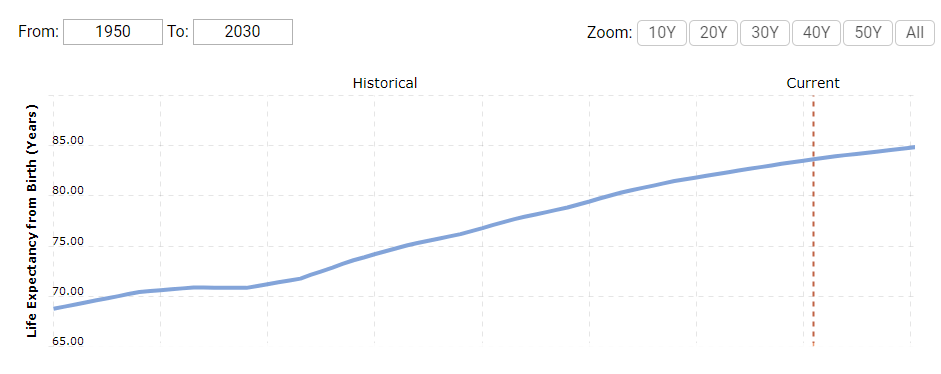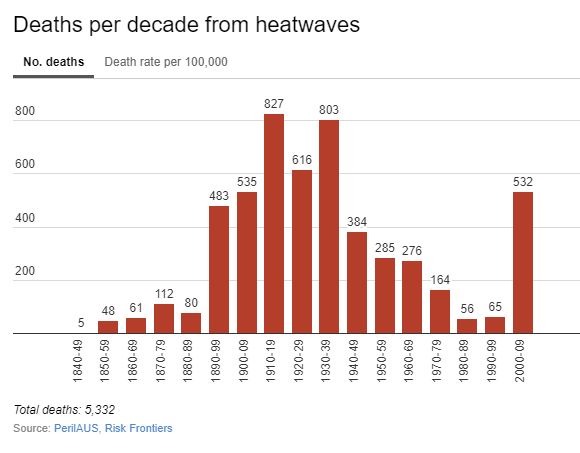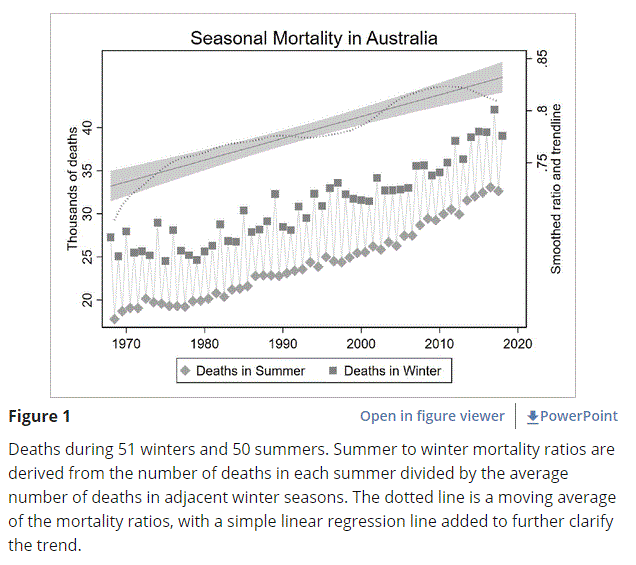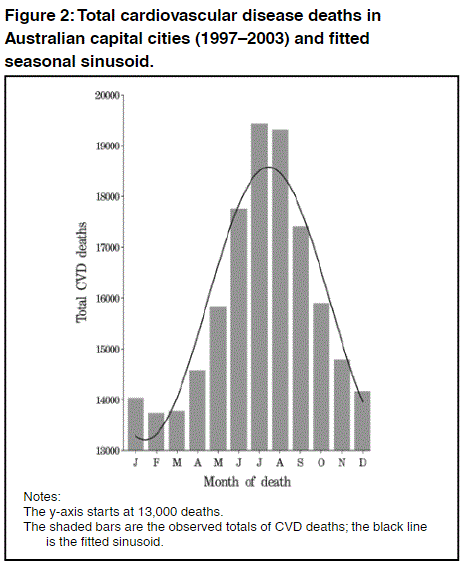This might be one of the most incompetent studies of 2o21
Hanigan, Dear and Woodward have done a “unique”, first of, *groundbreaking study* that finally shows climate change is having a detrimental effect on our health (so they say). With great effort to ignore almost every variable that mattered, they found the seasonal ratio of deaths in Australia has changed:
”More people die in winter than summer, but climate change may see this reverse
In our study published today, we show some of the first evidence climate change has had observable impacts on Australians’ health between 1968 and 2018.
We found long-term heating is associated with changed seasonal balance of deaths in Australia, with relatively more deaths in summer months and relatively fewer deaths in winter months over recent decades.
Our findings can be explained by the gradual global warming associated with climate change. Over the 51 years of our study, annual average temperatures increased by more than 1°C in Australia. The last decade (2011 to 2020) was the hottest in the country’s recorded history.
The other interpretation is that it got warmer and deaths in winter declined more than deaths in summer did.
Basically if climate change does anything, it’s saving us from even more deaths in cold weather. Three cheers for fossil fuels.
The climate trend is unequivocal: The hotter it got the longer we lived
Looks like climate change saves lives even in hot sunny Australia:

Source: Macrotrends
But Hanigan et al miss the obvious and work pretty hard to find that the slope of the summer deaths (diamonds) below is rising slightly faster than the winter deaths (squares). Panic now. That’s how bad climate change is (and that how overfunded our universities are.)
Here’s another awkward fact: Heatwave deaths in Australia peaked around World War I?

Australian heatwave deaths peaked around World War I. Source: PerilAUS
Even in the deadly decade of 2000 to 2009, heatwave deaths were less than 0.5% of total deaths. That scary last column is not the big killer you might think.
“Our research is unique
“Globally, our study is one of very few that directly shows the health impacts of climate change.
Instead their study directly shows what a waste of money higher education is:
In our study, we used Australian mortality records that have been collected with remarkable consistency of detail and quality over the last half century. And by focusing on the ratio of summer to winter deaths within each year, we avoid possible confounding associated with, say, improvements to health care.
So they avoided the confounding factor of “improvements in health care” but completely forgot that people predominantly died of different things in 1968 — like especially heart failure and influenza, both more common in winter. Lately, the increase in deaths due to Alzheimers and dementia spread those fatal events across the year. This one factor alone probably explains the minor trend they found.
They haven’t found a climate change effect at all, it’s just the effect of a changing pattern of diseases:
Ischemic heart disease is surprisingly more of a winter disease. There’s less sun, less vitamin D, room temperatures are colder, blood pressure goes up, and inflammation is more likely and makes everything worse. Nothing kills as many people as moderate cold.
For a second, the researchers even have to admit that more climate change might save more lives (and we can’t have that!):
In one study on the topic, the authors found Australia may initially experience a net reduction in temperature-related deaths. That is, increased deaths from heat during summer would be offset by fewer deaths in winter, as winters become more mild.
What do you know: models arrive to rescue the doomer narrative:
However, they predict this pattern would reverse by mid-century under the business-as-usual emissions scenario.
Just one more irrelevant discovery:
We found the speed of change in the ratio of summer to winter deaths was fastest in the hottest years within each decade.
So on long term rising trends for both temperatures and deaths, what’s the bet that the last years of each decade are more likely to be both hotter and more deadly? Shock me.
This paper is more evidence that it takes ineptitude to have a good career in science these days. Being sensible is a handicap.
Who gave them their grant money?
Related:
- Study on 74 million deaths show cold weather kills 20 times more than heat does.
- We need to protect our health system from Climate-change-doctors
REFERENCES
Barnett et al (2008) The seasonality in heart failure deaths and total cardiovascular deaths, Aust and NZ Journal of Public Health, vol 32, no 5.
Ivan C. Hanigan , Keith B.G. Dear, Alistair Woodward (2021) Increased ratio of summer to winter deaths due to climate warming in Australia, 1968–2018, 26 April 2021 https://doi.org/10.1111/1753-6405.13107 PDF
ABS: https://www.abs.gov.au/ausstats/[email protected]/0/b066d450abaaa4c7ca256dea000539dc

